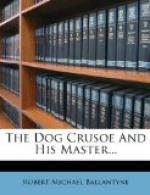The grizzly bear resembles the brown bear of Europe, but it is larger, and the hair is long, the points being of a paler shade. About the head there is a considerable mixture of gray hair, giving it the “grizzly” appearance from which it derives its name. The claws are dirty white, arched, and very long, and so strong that when the animal strikes with its paw they cut like a chisel. These claws are not embedded in the paw, as is the case with the cat, but always project far beyond the hair, thus giving to the foot a very ungainly appearance. They are not sufficiently curved to enable the grizzly bear to climb trees, like the black and brown bears; and this inability on their part is often the only hope of the pursued hunter, who, if he succeeds in ascending a tree, is safe, for the time at least, from the bear’s assaults. But “Caleb” is a patient creature, and will often wait at the foot of the tree for many hours for his victim.
The average length of his body is about nine feet, but he sometimes attains to a still larger growth. Caleb is more carnivorous in his habits than other bears; but, like them, he does not object to indulge occasionally in vegetable diet, being partial to the bird-cherry, the choke-berry, and various shrubs. He has a sweet tooth, too, and revels in honey—when he can get it.
The instant the grizzly bear beheld Dick Varley standing in his path, he rose on his hind legs and made a loud hissing noise, like a man breathing quick, but much harsher. To this Crusoe replied by a deep growl, and showing the utmost extent of his teeth, gums and all; and Dick cocked both barrels of his rifle.
To say that Dick Varley felt no fear would be simply to make him out that sort of hero which does not exist in nature—namely, a perfect hero. He did feel a sensation as if his bowels had suddenly melted into water! Let not our reader think the worse of Dick for this. There is not a man living who, having met with a huge grizzly bear for the first time in his life in a wild, solitary place, all alone, has not experienced some such sensation. There was no cowardice in this feeling.
Fear is not cowardice. Acting in a wrong and contemptible manner because of our fear is cowardice.
It is said that Wellington or Napoleon, we forget which, once stood watching the muster of the men who were to form the forlorn-hope in storming a citadel. There were many brave, strong, stalwart men there, in the prime of life, and flushed with the blood of high health and courage. There were also there a few stern-browed men of riper years, who stood perfectly silent, with lips compressed, and as pale as death. “Yonder veterans,” said the general, pointing to these soldiers, “are men whose courage I can depend on; they know what they are going to, the others don’t!” Yes, these young soldiers very probably were brave; the others certainly were.




